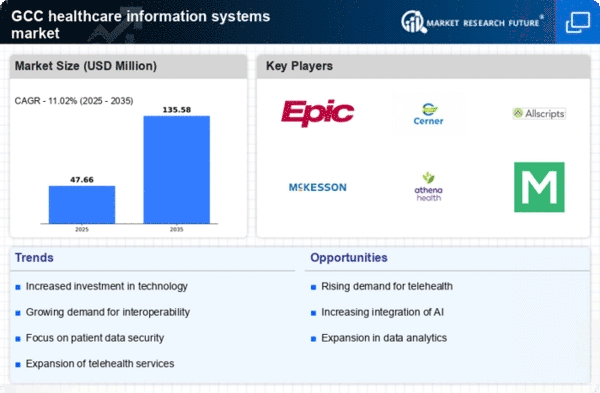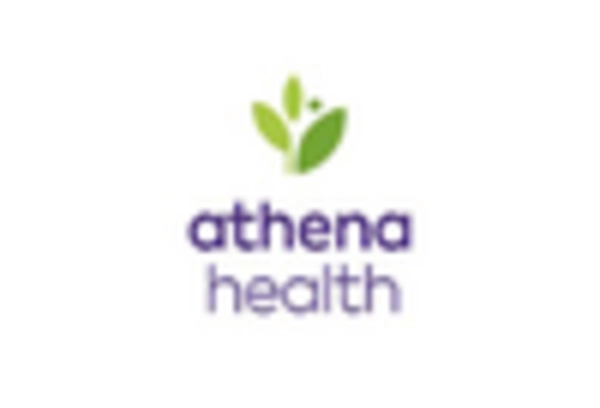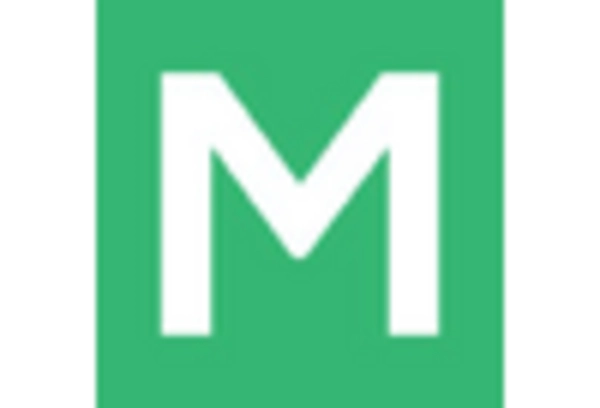Growing Focus on Patient-Centric Care
The shift towards patient-centric care is influencing the healthcare information-systems market in the GCC. Healthcare providers are increasingly recognizing the importance of tailoring services to meet individual patient needs. This paradigm shift necessitates the implementation of advanced information systems that can support personalized treatment plans and enhance patient engagement. As a result, the demand for healthcare information systems that facilitate real-time data access and patient communication is on the rise. Market analysts suggest that systems enabling telemedicine and remote monitoring will see heightened adoption, as they align with the goals of patient-centric care. This focus on improving patient experiences is likely to drive innovation and investment in the healthcare information-systems market.
Government Initiatives and Regulations
Government initiatives and regulations play a crucial role in shaping the healthcare information-systems market. In the GCC, various governments are implementing policies aimed at enhancing healthcare infrastructure and promoting the adoption of advanced technologies. For instance, the introduction of mandatory EHR systems in public hospitals is expected to drive market growth significantly. Additionally, regulatory frameworks that encourage interoperability among different healthcare systems are likely to foster a more integrated approach to patient care. The GCC region's commitment to improving healthcare outcomes through technology is evident in its strategic plans, which allocate substantial budgets for health IT investments. This regulatory support is anticipated to create a conducive environment for the healthcare information-systems market to thrive.
Technological Advancements in Healthcare
Technological advancements are significantly impacting the healthcare information-systems market. Innovations such as cloud computing, mobile health applications, and big data analytics are transforming how healthcare providers manage patient information. The integration of these technologies allows for more efficient data management and improved decision-making processes. In the GCC, the adoption of cloud-based solutions is particularly noteworthy, as they offer scalability and flexibility for healthcare organizations. Furthermore, the increasing use of mobile applications for health monitoring and management is expected to enhance patient engagement and adherence to treatment plans. As these technologies continue to evolve, they are likely to drive further growth in the healthcare information-systems market, enabling providers to deliver higher quality care.
Rising Demand for Digital Health Solutions
The healthcare information-systems market is experiencing a notable surge in demand for digital health solutions across the GCC region. This trend is driven by the increasing need for efficient patient management systems and electronic health records (EHRs). As healthcare providers seek to enhance operational efficiency, the market for healthcare information systems is projected to grow at a CAGR of approximately 15% from 2025 to 2030. The integration of digital tools facilitates better patient engagement and streamlined workflows, which are essential for modern healthcare delivery. Furthermore, the GCC governments are investing heavily in digital health initiatives, aiming to improve healthcare accessibility and quality. This investment is likely to further propel the adoption of healthcare information systems, making them indispensable in the evolving healthcare landscape.
Increased Investment in Health IT Infrastructure
Investment in health IT infrastructure is a key driver of the healthcare information-systems market in the GCC. As healthcare organizations strive to modernize their operations, there is a growing emphasis on upgrading existing systems and implementing new technologies. This trend is supported by both public and private sector investments aimed at enhancing healthcare delivery and operational efficiency. Reports indicate that the GCC region is expected to allocate over $1 billion towards health IT initiatives in the coming years. Such investments are likely to facilitate the development of robust healthcare information systems that can support data sharing, improve patient outcomes, and streamline administrative processes. The commitment to enhancing health IT infrastructure is poised to significantly influence the trajectory of the healthcare information-systems market.
















